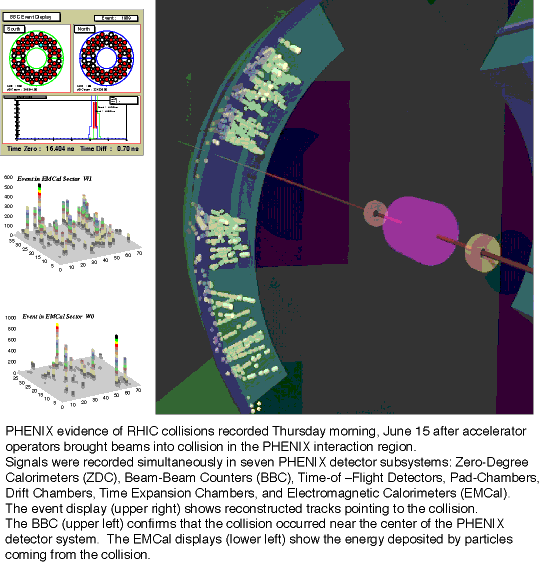Last week marked the tenth anniversary of the first recorded collision of the nuclei from two gold atoms by the PHENIX collaboration at the Relativistic Heavy Ion Collider at Brookhaven National Laboratory. This collision (shown below) and the billions of billions that followed, have deepened our understanding of the structure of matter and what holds it together on the smallest size scales and the largest energy scales. From the beginning, ACU and our Nuclear Physics Research Team have been part of this work.

Event display of the first Au+Au collision recorded by the PHENIX detector.
In an email to the PHENIX collaboration, the spokeswoman, Barbara Jacak said, “Precisely ten years ago, PHENIX recorded our very first collision. It has been quite a journey from that day to now. Our accomplishments include 88 papers published and several more in the refereeing process. The many thousands of citations garnered by these papers are a testament not only to our productivity, but also to the importance of our data. In the incredibly successful Run-10, we recorded almost exactly one petabyte of data! Such volumes seemed downright scary a decade ago, and now we have blazed a trail wherein it is simply normal. Our scientific and technical impact from the first decade is enormous, and I am confident that the impact from the next decade will be as well!”
I joined the PHENIX collaboration in 1999 and have been an active member ever since that time. During the past ten years 36 ACU students have been involved with this research. Most of these students and 4 ACU faculty members have contributed sufficiently to be listed as authors on the papers published by PHENIX. In fact, there has not been a PHENIX publication that does not include a member of our team as an author.
It is worth noting that the students that got experience working on PHENIX have followed very different but also very successful career paths. While some students have continued in graduate school to pursue a degree in nuclear physics, other students have decided to specialize in other fields of physics. Other students have gone to graduate school in fields of engineering, math, and computer science. Some students have gone to medical school or even medical physics. Of course several students sought employment after graduating from ACU and found great jobs in education and industry. What all of these students have in common is that while they were helping us learn more about the nature of the world around us, they were also gaining a valuable experience that helped them prepare for their future.
-Dr. Towell

omi
7:05 am, 08.18.10
So I would like you to know that i am interested and impressed with science. I also acknowlede your dedication to our uncertanty. just do me a favor and don’t outsmart your commonsence for all of our sakes thanks!
Michael Daugherity
11:48 am, 08.24.10
I’m curious about what you mean, omi. If you’re referring to the stories about particle accelerators creating a black hole and destroying the Earth (the Daily Show did a great story with Steve Carrel when RHIC started, there have been many similar stories with the LHC start-up) then this is why I’m not concerned:
There are naturally occurring collisions that are many thousands of times more powerful than anything we can create in a lab.
Since cosmic rays with energies of 10^18 eV and above don’t destroy the Earth, we can’t either. This is our version of common sense.
Personally, I’m rather fond of living on Earth. We plan on keeping it far away from black holes.
-Dr. D